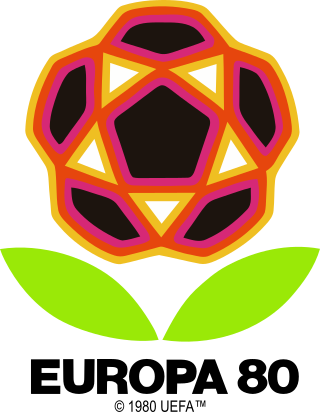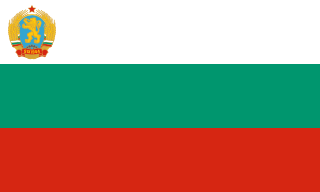
The 1980 UEFA European Football Championship finals tournament was held in Italy. This was the sixth UEFA European Championship, which is held every four years and endorsed by UEFA. It was the first European Championship to feature eight teams in the finals, which took place between 11 and 22 June 1980. West Germany won the final 2–1 against Belgium for their second title. This was the last European Championship with a third place play-off.

Bulgaria competed at the 1960 Summer Olympics in Rome, Italy. 98 competitors, 89 men and 9 women, took part in 66 events in 12 sports.
The 1960–61 season of the European Cup Winners' Cup club football tournament was won by Italian club Fiorentina in two-legged final victory against Rangers of Scotland.
The qualification for the 1984 European Competition for Women's Football was held between 18 August 1982 and 28 October 1983.

Brazil competed at the 1960 Summer Olympics in Rome, Italy. 72 competitors, 71 men and 1 woman, took part in 35 events in 14 sports. Brazilians obtained two bronze medals in Rome. The swimmer Manuel dos Santos was a bronze medalist in men's 100 metre freestyle. The men's basketball team also won the bronze medal. Flagbearer and defending two-time Olympic champion Adhemar Ferreira da Silva could not repeat his performance and placed fourteenth in the triple jump,
The football tournament at the 1960 Summer Olympics was held from 26 August to 10 September in 1960 throughout Italy. The tournament featured 16 men's national teams from four continental confederations. The 16 teams were drawn into four groups of four and each group played a round-robin tournament. At the end of the group stage, the first-ranked teams of each group advanced to the semi-finals, and culminating with the gold medal match in Rome on 10 September 1960.
The 1997 Mediterranean Games football tournament was the 13th edition of the Mediterranean Games men's football tournament. The football tournament was held in Bari, Italy between 16 and 25 June 1997 as part of the 1997 Mediterranean Games and was contested by 13 teams, all countries were represented by the Olympic teams. Italy won the gold medal.
The knockout stage of the 1990 FIFA World Cup was the second and final stage of the final tournament, following the group stage. It began on 23 June with the round of 16 matches, and ended on 8 July with the final held at the Stadio Olimpico in Rome, in which West Germany beat the defending champions Argentina 1–0 to claim their third World Cup.
The 1979 European Competition for Women's Football was a women's football tournament contested by European nations. It took place in Italy from 19 to 27 July 1979.
After the completed dissolution of Yugoslavia in 2006, the Serbia national team did not qualify for the next four UEFA European Championships it played qualifiers for, before finally securing a spot at Euro 2024. Its official predecessor teams Yugoslavia and FR Yugoslavia/Serbia & Montenegro were more successful: the team representing "larger" Yugoslavia became European vice-champions twice while the union of Serbia and Montenegro reached the quarter-finals at Euro 2000.
Group 5 consisted of five of the 34 teams entered into the European zone: Denmark, Greece, Italy, Luxembourg, and Yugoslavia. These five teams competed on a home-and-away basis for two of the 14 spots in the final tournament allocated to the European zone, with the group's winner and runner-up claiming those spots.
The 1948–53 Central European International Cup was the fifth edition of the Central European International Cup played between 1948 and 1953. It was played in a round robin tournament between five teams involved in the tournament.
Group 6 of the UEFA Euro 1972 qualifying tournament was one of the eight groups to decide which teams would qualify for the UEFA Euro 1972 finals tournament. Group 6 consisted of four teams: Italy, Austria, Sweden, and Republic of Ireland, where they played against each other home-and-away in a round-robin format. The group winners were Italy, who finished three points above Austria.
The 1964 European Nations' Cup qualifying preliminary round was the first round of the qualifying competition for the 1964 European Nations' Cup. It was contested by 26 of the 29 teams that entered, with Austria, Luxembourg and the Soviet Union receiving a bye to the following round. The winners of each of thirteen home-and-away ties progressed to the round of 16. The matches were played in 1962 and 1963.

The final tournament of UEFA Euro 1968 was a single-elimination tournament involving the four teams that qualified from the quarter-finals. There were two rounds of matches: a semi-final stage leading to the final to decide the champions. The final tournament began with the semi-finals on 5 June and ended with the final replay on 10 June at the Stadio Olimpico in Rome. Italy won the tournament with a 2–0 replay victory over Yugoslavia.
Group 1 of the 1960 Summer Olympics football tournament took place from 26 August to 1 September 1960. The group consisted of Yugoslavia, Bulgaria, United Arab Republic and Turkey. The top team, Yugoslavia, advanced to the semi-finals.
Group 3 of the 1960 Summer Olympics football tournament took place from 26 August to 1 September 1960. The group consisted of Denmark, Poland, Tunisia and Argentina. The top team, Denmark, advanced to the semi-finals.
Group 4 of the 1960 Summer Olympics football tournament took place from 26 August to 1 September 1960. The group consisted of Hungary, Peru, India and France. The top team, Hungary, advanced to the semi-finals.
The knockout stage of the 1960 Summer Olympics football tournament was the second and final stage of the competition, following the first round. Played from 5 to 10 September, the knockout stage ended with the final held at Stadio Flaminio in Rome, Italy. The top team from each group advanced to the knockout stage to compete in a single-elimination tournament. There were four matches in the knockout stage, including a third place play-off played between the two losing teams of the semi-finals.
The 1960 Summer Olympics football tournament gold medal match was the final match of the 1960 Summer Olympics football tournament, the 13th edition of Olympic competition for men's national football teams. The match was played at Stadio Flaminio in Rome, Italy, on 10 September 1960, and was contested by Yugoslavia and Denmark.



